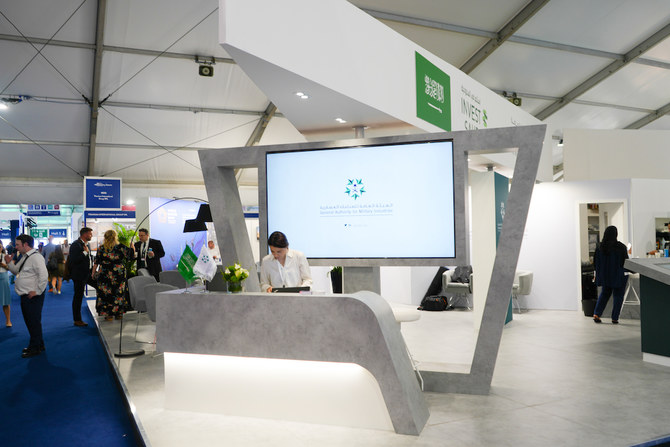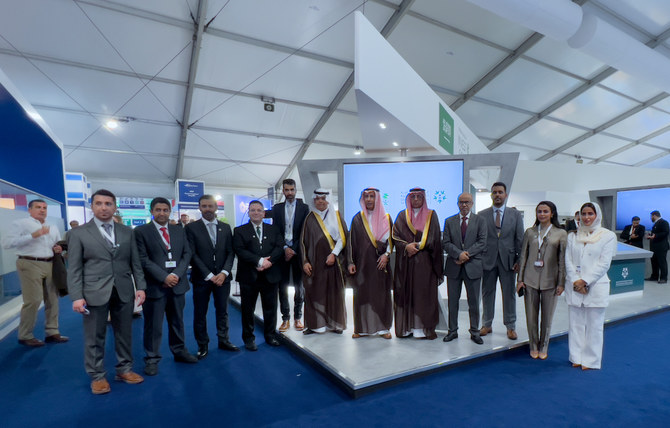FARNBOROUGH: Saudi Arabia plans to develop its nascent defense industry into a global powerhouse with a strategic mix of domestic spending on education, research and development, and significant local and foreign investment.
This plan was outlined on Monday in a statement issued by the General Authority for Military Industries’ Governor Eng. Ahmad Al-Ohali, on the opening day of the Farnborough International Air Show in the UK, which runs until July 22. GAMI’s role is to bring together key players, covering a range of areas from manufacturing to education.
Al-Ohali opened the Kingdom’s pavilion at the show. This is the first Farnborough event since 2018 because the 2020 edition was cancelled. The industry is now recovering from the pandemic that ravaged the sector.
“As one of the world’s 20 biggest economies, the Kingdom is opening itself up to international investment and on an unprecedented scale. This has been our journey since 2017 and under the guidance of Vision 2030. It is an exciting prospect for any original equipment manufacturer or any other investor around the world to become a part of this journey of transformation,” Al-Ohali stated.
“With the localization and technology development plans, supply chain program, our human capital strategy, the World Defense Show, and many other programs, Saudi Arabia will not only expand its footprint in the global defense industry, but also become a hub for innovation in defense,” he added.
“Saudi Arabia today is an investment powerhouse and our reforms over the past several years are proof that we are ready to take all necessary measures to maintain and build on the momentum,” Al-Ohali said.
With Saudi Arabia’s goal of localizing more than 50 percent of its expenditure on defense by 2030, GAMI hopes to develop its nascent industry by collaborating with different stakeholders in the defense and security sectors.
“For example, we have identified our platforms (and) localization plans, developed a robust industrial and services supply chain program, a Military Industry Human Capital program, organized the World Defense Show, and much more. None of this would have been possible if we didn’t have the support of other government stakeholders like the Ministry of Defense and other security ministries, as well as the public and private sector players such as Saudi Arabian Military Industries, and the local and international original equipment manufacturers.”
A key to this expansion has been a supply chain program that would streamline processes in manufacturing and services. “This program has shined a light on the gaps in our local supply chain, which has translated into more than 74 investment opportunities worth billions of dollars for investors all over the world.”
The organization has determined six defense segments that present opportunities for investment, including land for manufacturing; maintenance repair and overhaul fixed wing; electronics; unmanned aerial vehicles; maintenance and repair for the navy; and production of personnel equipment.
Al-Ohali added that one of the key aspects of the program has been the establishment of the Military Industry Marketplace. MIM is a digital gateway into the defense ecosystem for investors and suppliers.
“GAMI does not only determine the investment opportunities in our localization initiatives, but we also make it easier for local and global investors to find the right opportunity and the right strategic partner for them in the Kingdom. Again, these are all key components of our effort to create a healthy, strong, sustainable ecosystem,” Al-Ohali said.
When talking about the Kingdom’s components of the local defense ecosystem, Al-Ohali said it included manufacturing, services, innovation, and education.
“These are all crucial aspects of a well-developed defense sector, but they all have one thing at their absolute core: Talented and skilled human capital. No sector can fully reach its potential without access to local talent, supported by education and training. This is why we have developed a Military Industry Human Capital strategy to make sure our greatest asset, the youth of our nation, is empowered to become the future leaders and innovators of the defense sector.
“Innovation, research and technology in the defense ecosystem is vital for sustainable localization. We are working closely with the newly established General Authority for Defense development to guide the defense technology development.”
Al-Ohali said training of young people was a key component of the strategy. “One such initiative is the National Academy of Military Industries, whereby GAMI is establishing an independent academy to train, upskill, and enable the national personnel that will ultimately help us realize our localization goals.”
Meanwhile, in other developments at the show, the European airplane manufacturer Airbus and several airlines said on Monday they had signed letters of intent to buy carbon removal credits to offset the emissions from air travel.
Airbus was joined by Air Canada, Air France-KLM, EasyJet, International Airlines Group, LATAM Airlines Group, Lufthansa Group and Virgin Atlantic, who have committed to engage in “negotiations on the possible pre-purchase of verified and durable carbon removal credits starting in 2025.”
In further news, General Electric Chief Executive Larry Culp said on Monday a new “GE Aerospace” brand for its aviation business pointed to a “wider strategic aperture” that could eventually lead to the industrial giant entering new businesses.
Asked at the Farnborough Airshow if that meant a greater appetite for acquisitions as the conglomerate prepares to split into three, Culp said any changes would be “first and foremost organic, and then and only then inorganic opportunities.”
Also at the show on Monday, the head of Qatar Airways said an “epidemic” of home working has contributed to staff shortages that are being widely blamed for travel disruption in Europe this summer.
The aviation sector is struggling to secure staff needed to cope with a post-pandemic surge in air travel, prompting London’s Heathrow Airport to impose curbs on capacity to avoid delays, in a move that led to tensions with Dubai’s Emirates.
In opening the show earlier in the day, outgoing Prime Minister Boris Johnson talked about the economy and alluded to his exit from Downing Street. “This government believes in aviation and its power to bring jobs and growth to the entire country.”
“After three years in the cockpit ... I am now handing over the controls seamlessly to someone else. I don’t know who,” he added, sparking laughter from delegates.
(With Agencies)























